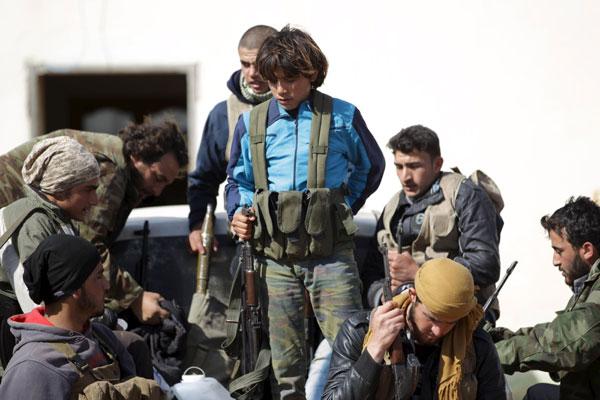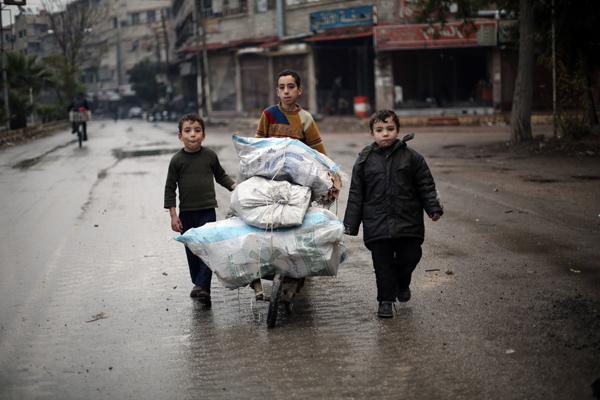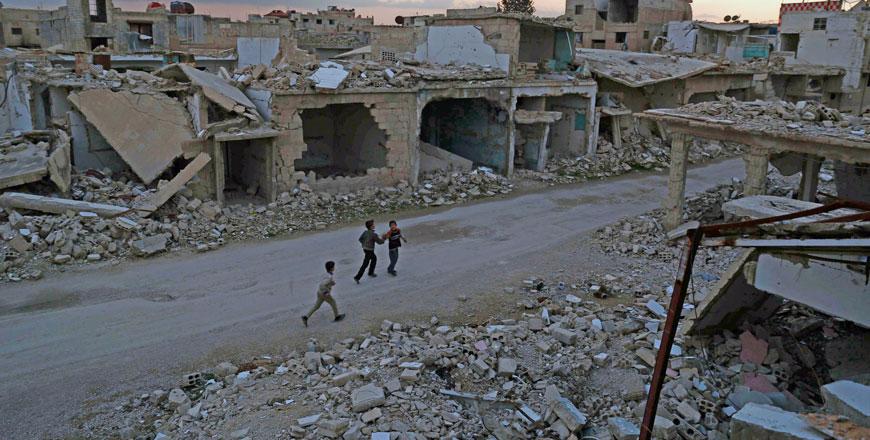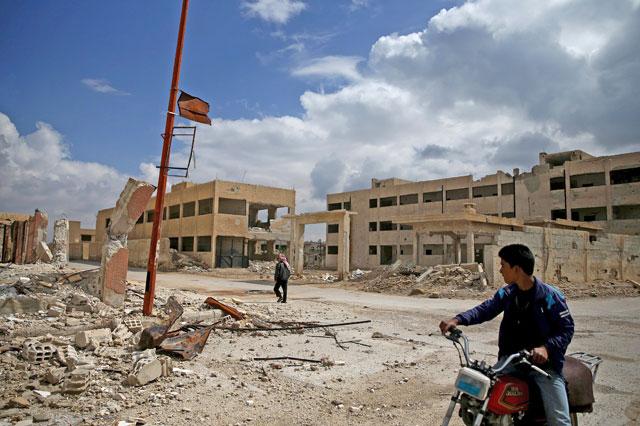You are here
Air strike hits Syrian market, opposition says truce must be respected
By Reuters - Mar 07,2016 - Last updated at Mar 07,2016

Fighters from Jaysh Al Sunna gather for a change of guards in Tel Mamo village, in the southern countryside of Aleppo, Syria, on Sunday (Reuters photo)
BEIRUT/GENEVA — A Syrian or Russian air strike reportedly killed a dozen of people at a market in northwestern Syria on Monday, straining a cessation of hostilities agreement meant to pave the way for peace talks.
In a further upsurge in violence, Al Qaeda's Nusra Front and other insurgents not included in the US-Russian agreement attacked government forces in a neighbouring province, a monitoring group said.
Al Nusra Front is widely deployed across western Syria in close proximity to groups that agreed to cease fire, many of which say they believe the government and its Russian allies can use the presence of the militants as an excuse to fight on.
The death toll from the air strike on a market selling diesel in rebel-held Idlib province was likely to rise, the Syrian Observatory for Human Rights said, adding that it did not know whether the Syrian government or its Russian ally was responsible.
Riad Hijab, chairman of the opposition High Negotiations Committee (HNC), said “tens” of people had been killed in what he described as a massacre. There was no word from the Syrian government, which has said it is respecting the agreement.
Hijab said the opposition would decide by the end of the week whether to attend the talks, which the United Nations aims to start this week. Another HNC member told Reuters the body was leaning towards going.
Al Nusra Front and the Islamist Jund al-Aqsa attacked government forces near the village of Al Ais in the southern Aleppo countryside on Monday and gained some ground in subsequent clashes, the Britain-based observatory said.
Yet the pace of the five-year-long war has slowed considerably since the cessation of hostilities agreement took hold on February 27, raising diplomats’ hopes for launching peace talks between the government and opposition.
Both sides have accused each other of violations of the cessation of hostilities agreement — the first of its kind towards ending a war that has killed more than 250,000 people and created refugee crises in the Middle East and Europe.
The agreement has been followed by more aid deliveries to opposition-held areas blockaded by the government, though the opposition says the quantities fall far short of the needs.
Disputed map
Rebels have said government forces, their war effort buoyed by five months of Russian air strikes, appear to be mobilising forces. Rebels say there have been numerous government attacks on their positions during the cessation, notably in northwestern Syria near the border with Turkey.
Russia has meanwhile said weapons are being supplied daily to rebels from Turkey, along with Saudi Arabia, one of the major foreign sponsors of the rebellion against Assad.
Russia’s Defence Ministry said on Monday eight ceasefire violations had been registered in Syria over the past 24 hours.
The Syrian army has said very little about operations in western areas of Syria covered by the agreement, though it has said operations against Nusra continue. In addition to the Nusra Front, the agreement also excludes the Daesh terror group.
The town struck in Monday’s air strike is close to an air base which Nusra Front and other groups captured last September. Government forces also shelled the rebel-held town of Jisr Al Shughour in Idlib province, the observatory said.
Hijab, speaking in a conference call with reporters, said he had sent a letter to UN Secretary General Ban Ki-moon to complain about a map of armed groups’ positions, which was published by the Russian Defence Ministry. He said the map was not accurate.
In a separate development in the multi-faceted conflict, the Syrian Kurdish YPG militia said the death toll from insurgent attacks on a mainly YPG-controlled residential quarter of northern city Aleppo on Sunday had risen to 16, including nine children.
The observatory said it was the biggest single toll since the agreement came into effect.
Governing authority
Western states have said the cessation of hostilities appears to be largely holding, hoping that will allow for peace talks to get underway. A previous attempt to convene talks was aborted in February before any face-to-face meetings took place.
The obstacles remain formidable, including the future of President Bashar Assad.
The opposition says the agenda must focus on setting up a transitional governing authority — an idea Assad has ruled out on the grounds its contravenes the current constitution.
HNC member Riad Nassan Agha said a final decision on attending the Geneva talks would depend on issues including degree of compliance with the truce and progress towards easing humanitarian conditions.
But noting what he described as a reduction in ceasefire violations by the government side in the last two days, Agha said “our inclination is to go” and said he expected opposition delegates to start arriving on Friday.
He added that truce violations must be reduced to “zero” and that nothing else must happen to obstruct the start of talks.
“We will go, God willing,” he said.
The agenda must focus on the “formation of a transitional governing authority” in line with a UN Security Council resolution, he said, adding: “We will not accept getting into issues outside what the resolution sets out.”
The opposition wants Assad removed from power at the start of a transitional period, a demand even their Western supporters have backed away from as Russia’s military intervention has reshaped the war in his favour.
Related Articles
BEIRUT — The head of the Syrian opposition's negotiating team said on Thursday it was not optimistic about peace talks getting under way in
BEIRUT/GENEVA — A senior official from Syria's main opposition group said on Monday that a fragile international attempt to halt nearly five
BEIRUT/GENEVA — Syria's army backed by Russian warplanes launched an assault north of Aleppo on Thursday, threatening to block a vital rebel


















